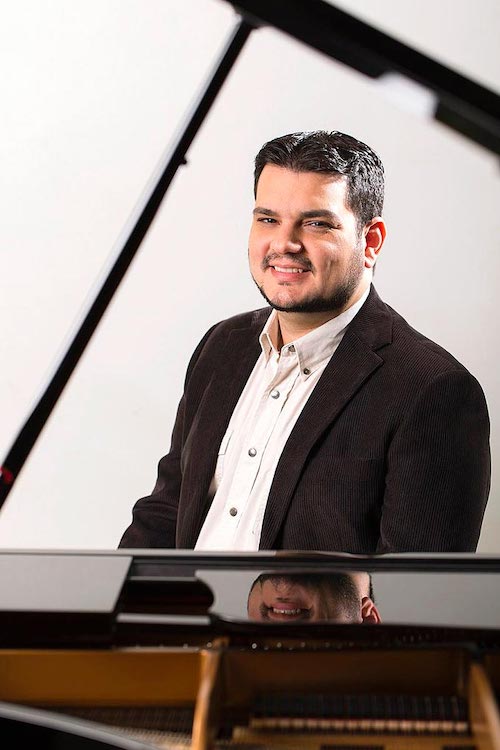Exuberant D’addona premiere stands out in lightweight NWS concert

The New World Symphony’s program “This is America” on Saturday night was intended to display current influences on concert music from varied cultural perspectives. Yet the highlight of the concert, filmed on the stage of the New World Center, turned out to be a new score for brass that looks backward, hearkening to the 1940’s and 50’s era when American composers brought a distinctively nationalist ethos to classical composition.
Festival Quintet by Venezuelan composer Giancarlo Castro D’addona was commissioned by the New World Symphony and received its premiere on this program. D’addona, a multi-talented composer, conductor and trumpet player, is an alumnus of the heralded El Sistema program in Venezuela. He is presently conductor of the orchestra at Reed College in Portland, Oregon.
His quintet for two trumpets, trombone, tuba and drums resounds in ten minutes of sheer joy. D’addona’s musical language suggests the mainstream American sound of Copland and Bernstein without any suggestion of a xerox copy. His thematic invention is delightfully inspired and his instrumental writing intricate. The score’s final section mixes Latin dance with modernist harmonies in an exuberant, uninhibited manner. D’addona is clearly a composer whose future is more than promising.
The five New World players gave the score a terrific launch. Gianluca Farina and Morgen Low’s agile trumpets and the warmly mellow horn solos of Corbin Castro were especially notable. With Charlie Rosmarin providing a steady drum beat, Arno Tri Pramudia’s trombone and Andrew Abel’s tuba added harmonic spice to a brilliant reading of a standout piece.
The other major work on the concert was A Requiem for Zula by PaviElle French. In pre-performance comments, French described her 20-minute creation as a “soul symphony.” Commissioned in 2018 by the Saint Paul Chamber Orchestra, the work is a tribute to her late mother, a community activist in the Rondo neighborhood of Saint Paul, Minnesota.

Conceived in seven connected sections, the score is, essentially, an ambitious pop song cycle. More complex than the average concept album, French’s musical style veers from gospel to soul, rhythm and blues and even rap. French is an authentic tunesmith who can write memorable themes and there is sincere emotion in this work. Michi Wiancko’s orchestration is skillful and multihued.
Sitting at the piano, the charismatic French unleashed a soulful, powerful voice and reams of heartfelt sorrow as she traced her path from her mother’s death to healing and returning to the light. Edwin Outwater adeptly conducted the distanced orchestral ensemble. Still, is this work really classical?
Outwater was also on the podium for Christopher Cerrone’s The Night Mare, a nine-minute soundscape for seven players and electronics. Cerrone recorded a train in Long Island, digitally altered the sounds and mixed them with the instrumental textures. The result is an eerie conflation that awaits a horror movie to accompany it. Elizabeth Lu’s breathy flute stood out in a strongly coordinated reading.
Wax and Wire, a brief 2014 vignette by Viet Cuong, is based on visual sculpture composed of wire. The clarinet’s wild leaps and quarter tones are reminiscent of Klezmer music. Jesse McCandless’s flexibility and speed proved stellar in the alternately challenging and folksy musical paragraphs.
The program opened with Riprap for marimba and string quartet by Gabriella Smith. Taking its title from the rocks and stones placed in the High Sierras (where the composer has often gone hiking) to aid horses traveling through the mountain range, the score is a study in sustained rhythm. It is an ear tickler that wears out its welcome after one hearing. The unidentified New World players gave a fine performance.
Members of the New World Symphony play Adolphus Hailstork’s Fanfare on Amazing Grace, Tania León’s Saoko, Couperin’s Royal Concert No. 2, Dvořák’s Wind Serenade and the world premiere of Alvin Singleton’s Time Past, Time Future with piano soloist Awadagin Pratt. Streaming 2 p.m. April 25. nws.edu
Posted in Performances
Leave a Comment
Sun Apr 18, 2021
at 1:43 pm
No Comments






